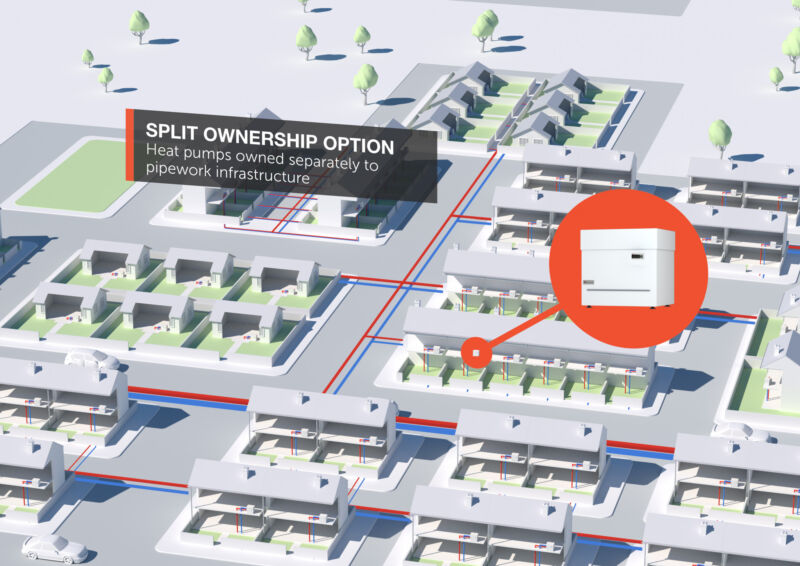A ground-breaking scheme delivering subsidised ground source heat pumps to 500 homes in Cornwall is being described as a blueprint for decarbonising domestic heating.
The two-year scheme is part of an £8.7 million ‘Heat the Streets’ project developed by Cornish ground source heat pump infrastructure and asset company, Kensa Utilities, and is supported by over £6 million of grants via the European Regional Development Fund (ERDF).
‘Heat the Streets’ is pioneering a new business model that installs highly efficient low carbon ground source heat pumps on a street-by-street basis, making the technology accessible to more households across the country and helping the UK realise it’s ambitious net-zero carbon targets.
Many of the installations will take place in the rural off-gas Cornish community of Stithians to create a sustainable ‘heat pump village’. The renewable heating upgrade here will include the largest number of private properties to be retrofitted with the technology in one go to date. There are over 29 million existing houses in the UK, of these 24 million are privately owned.
Lisa Treseder, Senior Project Manager at Kensa Utilities, said: “The ‘Heat the Streets’ project will demonstrate how we can deliver net zero now, for everyone, on our existing housing stock and without leaving out the privately owned neighbours. In this instance,we are delighted to have secured the ERDF grant funding which makes ground source heating possible for households of any tenure, so we can upgrade every property in the selected street within the selected neighbourhoods to ground source.
She continues: “With the government’s ambition to ‘build back greener’ and be seen as leading the fight against climate change, it is exciting to think that a Cornish village is providing a blueprint for making ground source heating accessible on a mass scale across the country.”
The Climate Change Committee (CCC) has repeatedly warned that energy efficiency needs addressing immediately and said that to meet net zero, the UK’s building stock needs to be nearly completely decarbonised by 2050. In a new report, the CCC has recently suggested that the UK should raise the bar for heat pump deployment targets from the 600,000 outlined in the Prime Minister’s 10-point plan, to 900,000 installations a year by 2028 – rising to 1.1 million a year by 2030.
Ground source heat pumps are highly efficient, reliable and durable which means they deliver lowrunning costs, low ownership costs and ultra-low carbon emissions. The barrier to increasing uptakeof the technology has traditionally been its higher capital cost due to the ground array.
Kensa Utilities has been set up to fund, own and maintain ground arrays. The company’s aim is to make ground source heat pumps more accessible and affordable by divorcing the cost of the ground array from the upfront purchase. Kensa Utilities owns the ground array and recovers its investment via a long-term annual connection fee.
Heat the Streets will use an innovative shared ground loop array system architecture made up of a communal network of underground pipework that will extract renewable heat via clusters ofboreholes. These boreholes will be drilled to depths of 50-150m and once installed, will be barely noticeable, but able to provide a reliable heat source all year-round. Although connected to thecommunal system, each home will receive its own ground source heat pump, offering residents full control over the heating and hot water in their own home, with independent billing, and the flexibility to switch energy suppliers and contracts if they so wish.
This innovative shared ground loop array infrastructure is long lasting and will require very little maintenance. Kensa Utilities considers this renewable heating infrastructure a 21st century equivalent to the gas network, and the key to enabling every home on an individual street to switch from fossil fuels to a clean, green ground source heat pump. By removing the expense of the ground array,Kensa is mimicking long-standing ‘split ownership’ arrangements in the gas sector with the underground infrastructure owned and maintained separately from the heat pump installed inside the properties.
According to Simon Lomax, CEO of the Kensa Group: “Over recent years hundreds of renewable energy projects have been delivered across the UK, but none of them have attempted to install ground source heat pumps in whole streets of mostly private houses at a time for very little upfront cost to the homeowner. The intent for the first phase of the project at Stithians is to demonstrate the possible cost savings when delivering ground source heat pump installations on a ‘street-by-street’ basis using communal shared ground arrays to maximise both running cost savings and carbon emission reductions.”
He continues: “Our vision is to supply ground source heat pumps for the price of an air source heat pump, breaking down the barriers stalling the uptake of the technology at the scale required to meet the net zero commitment. The far superior efficiency of ground source heat pumps, particularly on colder days, will be hugely beneficial to the electricity system so we see huge potential for this model as many entities want to follow our example and own the underground infrastructure.”




